Rediscovering Muscle Shoals (Interview)
Despite it’s isolated, rural location, Muscle Shoals, Alabama has been a hot bed of musical activity over the past 50 years with everyone from Aretha Franklin and Wilson Pickett to The Rolling Stones and Bob Dylan making their way to the tiny studios in order to get some of that Muscle Shoals mojo. In 2013, film director Greg Camalier put together a documentary titled Muscle Shoals that features not only artists such as The Stones and Aretha, but the people behind the sound such as producer and studio owner Rick Hall and the local session musicians eventually known as The Swampers. With the film being released on DVD, it seemed like a good idea to give director Greg Camalier a call and find out a bit more about the making of Muscle Shoals. And so The 13th Floor’s Marty Duda tracked Camalier down at his home in Boulder, Colorado and was surprised to find out that Camalier had no previous experience making films.
Listen to the interview with Muscle Shoals director Greg Camalier here:
Or, read a transcription of the interview here:
MD: I guess I want to just start out by, from the things I’ve read, I understand that you were working in, possibly still at working as, a real estate agent in Boulder, Colorado, did you have previous film making experience before making this or did you start cold?
GC: No, I started cold.
MD: Amazing!
GC: Yeah, yeah. I’ve never taken a class or anything. I don’t even have any home movies to vouch for.
MD: I see. So what made you think you were gonna be able to pull this off?
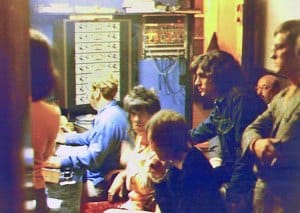
GC: That’s a good question. Well, I was really missing a creative aspect in my life and I was a musician earlier in my life and that never panned out and I had given up that. I just felt like film was something that I wanted to try and I felt like, you know, I could probably do a good job but you never know for sure until you actually do it, but I was definitely excited to try.
MD: Right. So just the process itself, what did you find, was there anything you found surprisingly easy or difficult for making a documentary from somebody who’s coming at it from completely the outside?
GC: Well I thought, you know, there’s a lot of technical aspects so when you come in cold on that level, that’s the challenge, but you start to ramp up to speed the more you do it.
MD: Right.
GC: As far as what came particularly easy, I felt, I did feel like there’s an opportunity in documentary film making to, you know, try new things and kind of strip the boundaries a little and you know, make it more enthralling than…it just seemed in that genre there was some room to try new things.
MD: And how would you say you did that in Muscle Shoals?
GC: Well, one by not approaching it just as a music story and focusing on the music itself, you know, that could be hours and hours .
MD: Right.
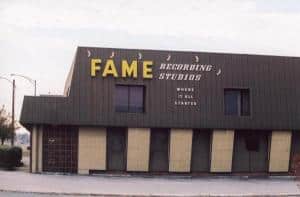 GC: So branching out into the sort of other aspects of the story you know, they’re connected to the music but they’re not what you would traditionally think, you know, on a music documentary so you know, I was really trying to do that and I also found that, you know, a richness in that and to meet the, you know, sort of make every frame count and making it to tell where we would tell sort of, you know, sequence of the story. To really try get them thinking, make it look rich, sound rich, story-wise be rich, you know, really try to pack a punch into every frame.
GC: So branching out into the sort of other aspects of the story you know, they’re connected to the music but they’re not what you would traditionally think, you know, on a music documentary so you know, I was really trying to do that and I also found that, you know, a richness in that and to meet the, you know, sort of make every frame count and making it to tell where we would tell sort of, you know, sequence of the story. To really try get them thinking, make it look rich, sound rich, story-wise be rich, you know, really try to pack a punch into every frame.
MD: Alright. I guess that the first thing that struck me watching the film was the footage of just the region itself. There’s some beautiful shots of swamps and rivers and lakes and, you know, I assume that was to get a feel for the geography of the place and how important the location was to how the music was made. How does a guy from Boulder, Colorado kind of connect to, you know, the swamp lands of Alabama?
GC: Well a couple of ways. One was that when we first went there, we were taken by the place and our first stop in the town was by that river and our last stop as we were leaving was by there and that’s where the actual idea to make the film came, along the banks of the water. We found it enticing, myself and my buddy, my producing partner I made the film with, Stephen Badger, and so I knew that I wanted to capture, sort of that feeling as best as I could in the film and then I think as far as the southern thing, I have some southern roots from my family, my grandparents themselves are from Virginia where I still go visit them. There also becomes a big component of like nature and your environment and how that affects you and all those things sort of gave me that, you know, free sensibility to that place and the environment and the impact it would have had probably on artists.
MD: Aand I guess the main character of the film, if there is one is Rick Hall.
GC: Correct.
MD: What was his reaction when, you must have had to approach him and let him know that you were making this film. Was he excited about the idea, was he wary about somebody coming in and making a film about his music?
GC: He was very wary, yeah. He had been approached a lot before and he’s not easily impressed and he’s not interested in wasting his time screwing it up so, having no film making experience. He was wary. I think it was about a year and a half in when he finally said,I think these guys might know what they’re doing.
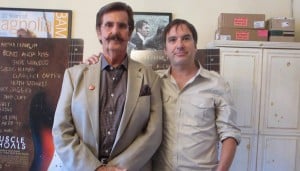
MD: Right. He comes off as an amazing character. What was your impression of him after making the film?
GC: Well he really comes across in the film I think a lot how he is and I think what you see in the film, he really is…his essence. I just have a lot of respect for him. I mean, you know, we’ve become really close at this point, he can be a friend now. He is what you see in the film, he is an amazing man, you know.
MD: Of course you managed to get a reunion of him and The Swampers. Was that the first time that they had really gotten together since the late 60s, early 70s?
GC: No, they live in a very small town so they would see each other around town and stuff. But I know that the drummer Roger and him, I don’t think they have seen each other till that actual moment in the film for about 7 years. So, but I think he’s seen David, Jimmy and David they would run into each other, but he hadn’t seen Roger for quite some time. Roger Hawkins.
MD: And was there still some animosity between them or at least uncomfortable feelings or has that stuff kind of gone away with the time lapse?
GC: I think obviously with time, it’s made it much more comfortable and healed wounds. But I do know from the feedback from those guys that by doing the film and having them come together, they’ve got a chance to, you know, say things to each other that they’ve never said face to face until I think a lot of, you know, a lot more healing, a lot of other, you know, additional good things came out of them all getting together again like this.
MD: Right, right and I guess the other prominent character who was rather surprising and I was surprised to see was Donna Godchaux, who you kind of don’t think of being associated with that scene, due to her work with the Grateful Dead. How did you get her involved in it?
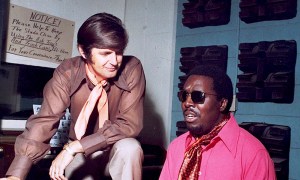
GC: Yeah. Well we were fascinated, she was from there and she was living there at the time and I had also been a big fan of Grateful Dead myself, the fact that she was singing on some of the early soul records and she was from there, I thought it was really fascinating. I knew that, tons of Deadheads would have no idea about that and yeah that was a pretty cool connect along with the other crazy connects that all intertwine Muscle Shoals.
MD: Alright. I mean there’s a lot of things you had to balance in the film. Theres the music itself, the personalities involved, theres politics and racial things. Did you spend a lot of time thinking about how those were going to be represented in the film or did you kind of go with it and see what happened?
GC: Well no, we had our themes and our questions, you know, really put together before the first interview, we knew we weren’t gonna have a narrator so you really need to know before you start any interviews, you know, what the themes in your film are gonna be and the stories. So we knew… now but at the same time we were open to things. Like at the very beginning we didn’t know about Rick’s personal story
MD: Right,
GC: And that’s something we learned as we were filming that I just, you know, thought to myself ‘wow this is too incredible to leave out like this is really like the spine of the story in a sense’ interested in what his back story was, it’s fascinating and really it’s like the spine of the story. So it’s a combination of like, you know, being open to discover something like that but also being prepared and knowing about your storyline and what you wanna touch upon.
MD: Right, and was there a difference in the attitude towards say Rick Hall and the session guys who worked and lived pretty much at Muscle Shoals as opposed to the artists, such as Percy Sledge or Aretha Franklin, who were there, did their thing and then left.
GC: Well the difference in the approach was that, people like Aretha and such, you’re only gonna get one chance to ask whatever you wanted to ask and so, yeah the pressure was on that everything feels right and you get everything you need and you know what you want and know what you wanna ask. That’s a big difference, there’s a lot of pressure, whereas with the other guys, you know, there is something, you can go back or you can explore, you can take a session to explore, not have to even, you know, have anything laid out. You know, so that’s a real luxury to have with the guys down there that you don’t get with a lot of these other subject matters, you get anything but that.
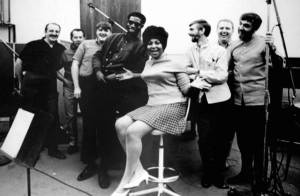
MD: Yeah. How was Aretha, what was her attitude to being involved in the film? I was kind of, pleasantly surprised that she was there so…
GC: She was very gracious. Yeah she was great. She hung out for a while as we filmed and watched the dailies and chatted about life and she was incredibly gracious.
MD: And the other person, the more contemporary person you have involved is Alicia Keys and I’m wondering how you came upon her and why you decided to choose her to kind of be involved in the film?
GC: Well we were just looking for a great, you know, musician and soul singer who could like, I knew wanted to do that song and so she’s at the top of our list because, you know, I don’t know how many people realise what a good musician she is. She’s a musician’s musician. She’s a phenomenal musician and incredibly soulful and not to mention her incredible voice. So she was our first source for someone to come and sing that song.
MD: Yeah she was just down here in Auckland performing at the end of last year. It was an amazing show.
GC: Oh cool.
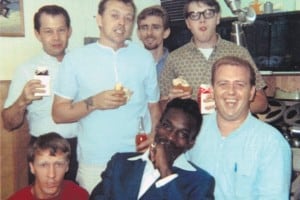
MD: Yeah and there is some, what seems to me like, archival interview footage. I mean, I assume the footage with Wilson Pickett is not stuff that you did because it’s been a while since he’s been around so.
GC: Right, yes.
MD: How did you go about finding the appropriate footage for some of those folks who are no longer with us?
GC: We had a great archivist on the film, he would go out and find stuff. I’m drawing a blank on what his name was, he did a great job for us and then Stephen did some, my producing partner, did some of the archival searching too. But anyway our archivist who’s listed in the film, I don’t know why his name escaping me right now.
MD: That’s alright.
GC: He is, you know, would go find the stuff. You know, we’d tell him artists that we were looking for and different things and he would go find all this amazing stuff and send us the screeners for them.
MD: And like for myself having been listening to this music and reading these names on liner notes on albums for years and years, It did seem like the culmination of something in the, almost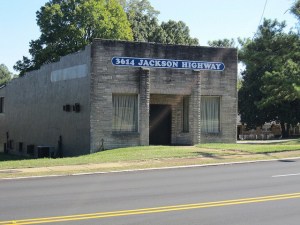 the end of something. The fact that these guys are back, you know, you’ve spoken to them all, you’ve kind of brought them all in one place and it’s kind of an end of an era. Does it feel like it’s an end of something or beginning of something
the end of something. The fact that these guys are back, you know, you’ve spoken to them all, you’ve kind of brought them all in one place and it’s kind of an end of an era. Does it feel like it’s an end of something or beginning of something
when you’re down there?
GC: Well I think it’s the beginning because, I mean Beats Electronics has just recently purchased thirty six fourteen (3614 Jackson Highway Studio) after the movie came out and they’re all jazzed about it and they’re putting, they renovating the entire studio and they’re gonna do all this amazing stuff. They’re having like people, they’re bringing in artists both established and unknown artists to come in there and record and so that’s going on and there’s this whole renaissance of, just energy going on down there right now. A lot of people going there to record, book studio time. There’s tonnes of people just travelling there now since the film.
[youtube https://www.youtube.com/watch?v=7UDe4JrFAIQ]
- Civil War – Dir: Alex Garland (Film Review) - April 9, 2024
- Pearl Jam – Dark Matter (Monkeywrench/Republic) Album Review - April 1, 2024
- Blonde Redhead – New Zealand Tour 2024 - March 14, 2024
